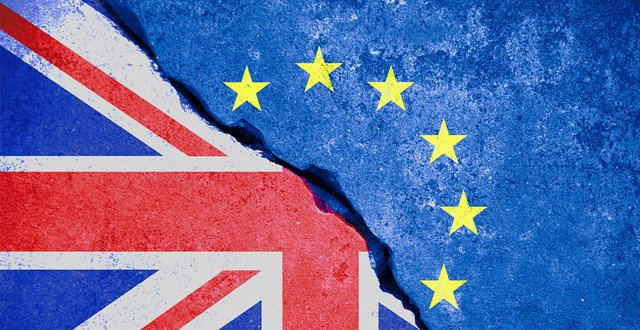Brexit has cast a shadow of uncertainty over many aspects of Irish life, including healthcare.
The possible ramifications for healthcare staff, access to medicines and cross-border collaboration were teased-out at an IMO seminar in Dublin on 18 January. The seminar was opened by IMO President Dr Ann Hogan and Chair of the Organisation’s International Affairs Committee Prof Trevor Duffy.
The current state of play on Brexit was outlined by the first speaker, MEP Ms Mairead McGuinness, Vice-President of the European Parliament. She said the UK will leave the European Union (EU) in March 2019, but the “expectation” is it will comply with existing frameworks until the end of 2020 (subsequent indications were that a transition period may extend beyond 2020).
She said it was “regrettable” that the UK “drew red lines” around issues such as the single market and customs union. There was a sense “in which they may need politically” to have a “divergence”, observed the MEP.
“The difficulty with that is, in all of the areas, but particularly in health, you really don’t want divergence; you want regulatory compliance and alignment, particularly in relation to drugs, medical devices, cross-border healthcare, you don’t want divergence….”
<h3 class=”subheadMIstyles”>CAWT</h3>
Ms McGuinness outlined many areas of connectedness between Ireland and the UK in respect of healthcare, including the EU-funded Co-operation and Working Together (CAWT) partnership between health and social care services in Northern Ireland and the Republic of Ireland.
She said many of CAWT’s projects were limited in duration, but often resulted in longer-term service level agreements, including arrangements for the provision of GP out-of-hours services in Castleblaney, Co Monaghan and Inishowen, Co Donegal, ENT services at Monaghan Hospital and Daisy Hill and Craigavon hospitals and renal services at Daisy Hill. She said it was unknown whether this type of ‘seed’ support would continue post-Brexit.
Ms McGuinness also touched on the matter of recognition of doctors’ qualifications.
“There are over 3,100 doctors registered with the General Medical Council in the United Kingdom who received their primary degrees here in Ireland and over 700 doctors registered with the Medical Council in Ireland received their primary degrees in the UK. Many Irish graduates complete their postgraduate training or spend a period of time in the UK before coming back to Ireland. Apart from the movement of UK and EU doctors, including across the whole island of Ireland, recognition of training and qualifications will have to be addressed in the negotiations, so that is another aspect where there cannot be clarity at this point,” she outlined.
Ms McGuinness pointed out that a new EU regulation on medical devices was just beginning to roll out “after several crises in the industry and failures of our system”.
“The real worry is we are trying to implement a regulation at a time when one large member state, that does a lot on medical devices, is actually leaving the system.”
She said it is “quite alarming for me to meet so many people in this sector, both pharma and the medical devices, who are really concerned about interruptions to the supply chain because of Brexit”.
<h3 class=”subheadMIstyles”>Medicines</h3>
Ms McGuinness noted that experts from the UK’s Medicines and Healthcare products Regulatory Agency (MHRA) “play a really pivotal role” in the European Medicines Agency (EMA) “and it would be awful if we lost that”.
She continued: “If you look at medicines and some of the figures, which are fascinating — 45 million patient packs [are] supplied from the United Kingdom to the European Union of 27 every month. And in reverse, 37 million from the EU-27 to the United Kingdom…. Interestingly, the UK’s withdrawal from EURATOM [European Atomic Energy Community] could also have an effect on the secure and consistent supply of radioisotopes in the UK and that is quite significant as well. So, if we don’t have a negotiated deal as of the day of withdrawal, which comes on 29 March 2019, medicinal products manufactured in the UK will be considered imported medicinal products, so they won’t have the same status as today and it is assumed that for centrally authorised medicinal products, the marketing authorisation holder will therefore need to specify an authorised importer established, as I said, in the EEA, within the union….
“It is also assumed that for centrally-authorised medicinal products, the marketing authorisation holder will need to change the location — and this will be costly — of its UK-based batch control to a location established in the EU [EEA] and submit the corresponding documents, etc. Now, this could take years for pharmaceutical companies and it could, if things go wrong, lead to shortages. And I wouldn’t speculate that that will happen, but I think those of us who are working on this issue need to understand that it might happen. In other words, if nothing gets done this is the inevitable consequence of the Brexit that isn’t negotiated effectively.”
Another issue highlighted by Ms McGuinness was access to healthcare in the Republic and Northern Ireland under the EU Cross-Border Healthcare Directive, by citizens of each jurisdiction, which has also been thrown into doubt.
She urged those present at the seminar to use their influence to raise issues of concern connected with Brexit.
<h3 class=”subheadMIstyles”>PCI centre</h3>
Co Donegal GP Dr Denis McCauley outlined the significant healthcare benefits that cross-border collaboration has had in border areas. One of the major developments has been access to the percutaneous coronary intervention (PCI) centre at Altnagelvin Area Hospital, Derry, for people in Donegal, who would otherwise not have access to life-saving cardiac interventions in the required timeframe.
“We have a situation now where if you are in Inishown, in Donegal, if you are within a 90-minute commute and you have a heart attack, we do an ECG and find you are having an acute ST-elevation MI [STEMI], we just ring, and it is just like adding water – you add water and an ambulance arrives, it is just fantastic. There is a service level agreement between the HSE in the north west with the Western Board, and it works.”
He also referred to capital funding of €19 million invested by the Irish Government in the North West Cancer Centre in Altnagelvin Area Hospital, which is providing radiotherapy care to people in the north west. “Older people were not going to Dublin for palliative radiotherapy because it was too far from their homes; there were people living in pain and dying in pain because they couldn’t raise themselves to go at that time to Dublin or Galway – now it is in Derry. Things are happening.”
Dr McCauley, who serves on the IMO GP Committee, said a further issue of concern is GP retention and recruitment.
“They are crying out for GPs in the UK; once Brexit comes everybody will go back to their countries so they will go looking for Irish GPs. At present, Irish general practice with the FEMPI cuts is in crisis.”
He also underlined that in the healthcare setting “there is no place for ambiguity”.
“When it comes to medicine you have to be certain of things; when it comes to politics, ambiguity is the name of the game really,” Dr McCauley observed.
It is vitally important that “we remain vigilant during the Brexit negotiations” and that collaboration is not threatened, he emphasised.
<h3 class=”subheadMIstyles”>Regulation</h3>
Ms Rita Purcell, Deputy CEO of the Health Products Regulatory Authority (HPRA), said whatever one may think about the EU, medicines regulation in Europe has been a success story. The processes in place have led to “huge consistency, acute depth of analysis of medicines before they come to the market, and much better risk-benefit analysis in relation to the medicines that you prescribe”.
She pointed out that adverse reactions to medicines are examined on a European-wide basis, heightening the quality of data and ability to protect patients.
“There’s a close relationship [between Ireland and the UK] – as a consequence, though, the pharmaceutical industry has effectively put joint products on the UK and Irish markets, so they are licenced for each market, but it’s the same label, it’s the same leaflet, it’s the same authorisation, it’s the same batch, so they run one batch of product and they send some to us and some to the UK. So, what will happen if those products are no longer authorised in the UK in the European market? How will that impact on our products? And that for us as the regulatory agency is our priority.”
The HPRA’s ultimate high-level strategic aim on Brexit is to maintain supply of medicines to the Irish market, said Ms Purcell.
“We have actually gone out there publicly and said, if the UK is the reference member state – in other words are they in charge of the authorisation of that product, if the product is on the Irish market, you can transfer it to us and there’ll be no charge, we’ll look after it, and we want to do that so that we can protect supply to the Irish market.”
The HPRA is “open to pragmatic solutions” and has been asking companies to contact the Authority if they anticipate that Brexit will impact their ability to supply product to the Irish market. “We can’t change EU law, but if there’s a solution that we can deliver as regulator, that is the message we are getting out there.”
The evening’s last speaker, RCPI CEO Mr Leo Kearns, also highlighted cross-border healthcare collaboration, including the congenital heart disease network, which is an all-island model of care.
He said Brexit is yet another issue of concern to a healthcare system in the Republic that is “incredibly challenged” and facing massive demographic pressures.
“I think one of our big, big challenges – it is there now and it will be there post-Brexit – is our ability to staff our health service. We can have everything else, but if we don’t have high calibre staff, nurses, doctors and health and social care professionals and management who can actually run the service, then we don’t have a health service. I think we really have to focus on making the Irish health service an attractive place to work and fulfilling place to work, because there are going to be pulls on our staff that I think will be accelerated by Brexit, so I think we really have to focus on that,” said Mr Kearns.
Meanwhile, the Department of Health has stated that a number of its line divisions are involved in preparations for Brexit, with the International and Research Policy Unit providing a leading role.
“Brexit is covered in the Business Planning Process of the Department for 2018. It should also be noted that Brexit planning is also covered in the HSE National Service Plan for 2018,” said a Department spokesperson.
The Department of Foreign Affairs and Trade “has responsibility for co-ordinating the whole-of-Government response”, the spokesperson added, and the two departments are working closely on Brexit’s implications.













Leave a Reply
You must be logged in to post a comment.